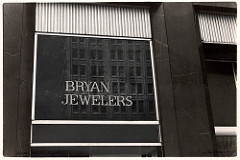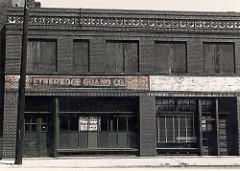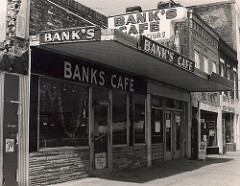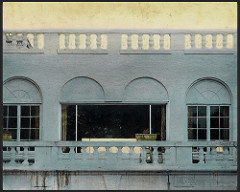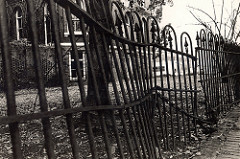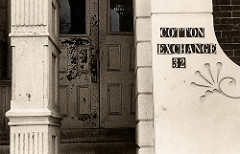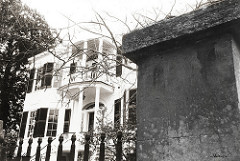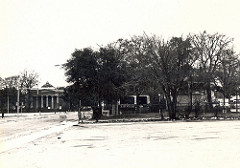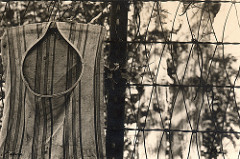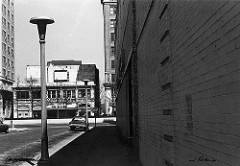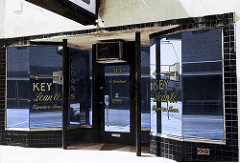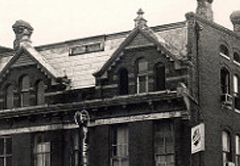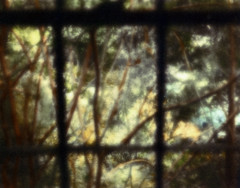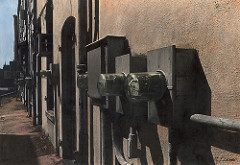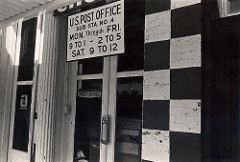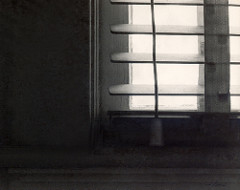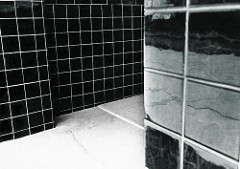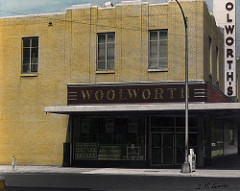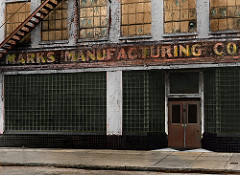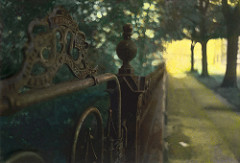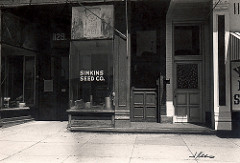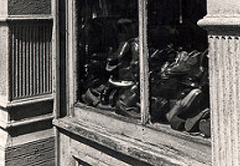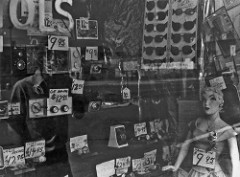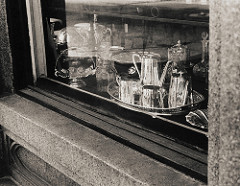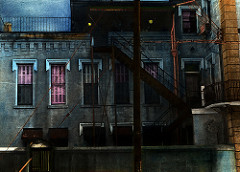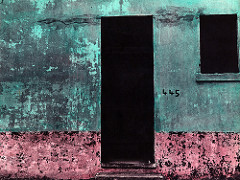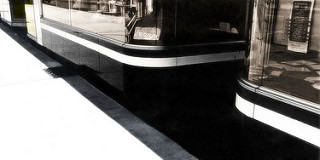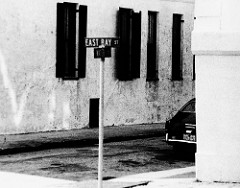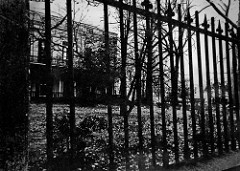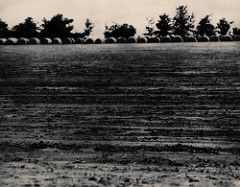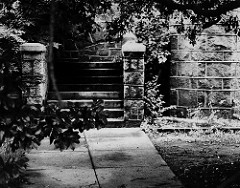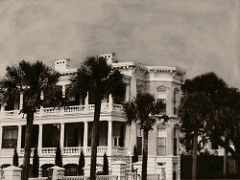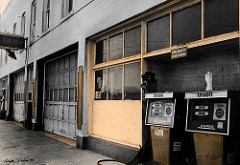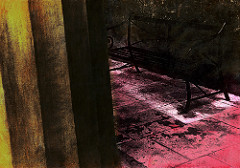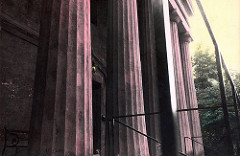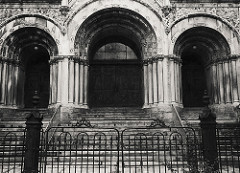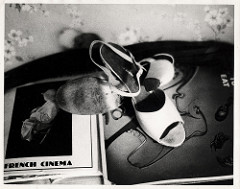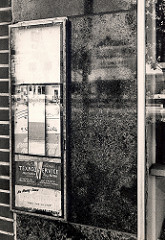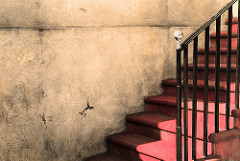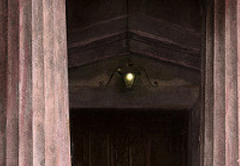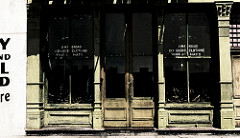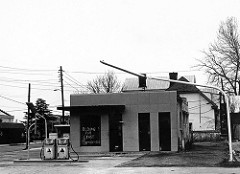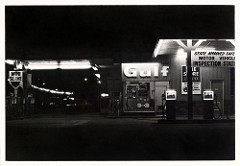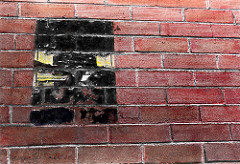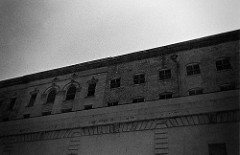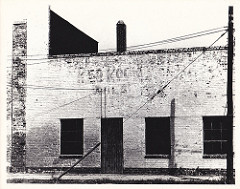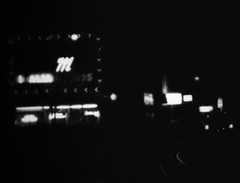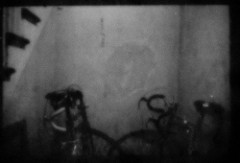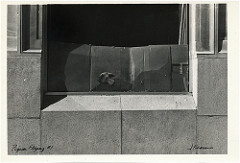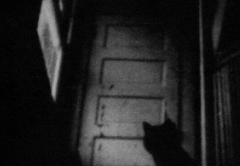Gertrude Herbert Institute of Art
Augusta, GA. Analogue photography. Mid 1970s.
artsbuilding
Located at 506 Telfair St., the building, originally a residence, was completed in 1818. I paid to take a class there when I was 15, drawing live, nude models, and was quite nervous as I had never drawn live nudes before, was used to drawing privately, and it was the first art class I'd ever taken. Though I'd practiced art all my life, since I was about four years of age and when I asked for a pencil and paper would become offended if I was handed a red pen and lined three-ring binder paper, I feared now that I was pursuing art haphazardly, knew I needed acquaintance with new materials, and wanted interaction with artists in new environments. I'd never been taken to an art museum, and there were no art books in my parental home other than a few I'd managed to purchase, but I devoured art books at the library. When I was five years of age, a couple of friend of my parents observed my inclination to the arts and gave me a small, slim, hardback book on drawing trees, and another companion book on drawing horses--I had immediately sat down and started drawing in the books, copying them, proud that I could mimic the lines, and so my parents put the books away as I didn't "know how to take care of books". My parents cared nothing about the arts--visual, film, literature--it was if they simply didn't exist. They had been to college but my mother only cared about Brahms and my father only cared about science--neither of them knew the names of any literary authors, playwrights, directors or artists. For whatever reason, I passionately and dedicatedly cared about all the arts, and fellow students at school thought of me as being "the artist", "the writer", "the musician" in the class because I could draw, write and play music, but I had never met an artist or an author, they were like rare beasts who lived in places I could never reach and which had nothing to do with me. All that I knew about art, other than my own love for drawing and painting, and having believed I was an artist, other than my thinking of art as a natural response to life, a dialogue with and appreciation for it, an exploration of meaning, of personal expression, was what I had learned in books, and I had begun to read about the lives of artists and had discovered they had communities, and that they studied art. I hoped I might find this new environment and meet artists at the Institute of Art, thus my shelling out my money for the class (I lived in my parent's home but out of money I earned babysitting I had to pay for all my clothes, books, art supplies, anything beyond basic room and board so this was a dedicated investment on my part). As it turned out, I was the only female, as the friend who was supposed to be taking the class with me, when we arrived the first evening, revealed she was instead using it as a cover for her meeting up with her boyfriend who was in his 20s and who she was not supposed to be seeing. So she would go down there with me, leave with him, then return at the end of the class. This made me even more nervous because I suddenly found myself in the position of having to lie for her to everyone, and I was also upset that this person had lied to me about our taking the class together up until the first evening we were dropped off. I was the only girl in the class, now with no moral support friend, and was surrounded by older men drawing and painting nude women. When you're fifteen and the only other female with you in a room of men is the nude model, however safe one may feel, and I did feel quite safe, one may still feel vulnerable. A reason I'd taken this particular class was that it was one of the only ones being offered, but also I had thought this was a skill I should develop. I expected to be given pointers, tips, but the teacher, who was a graphic designer for Lilly Cups, didn't speak to me at all. That is, he didn't speak to me at all until one day, during a break, in front of all the other men, he suddenly addressed me and asked, "Why are you here?"
During these breaks, the model would throw on a robe and grab a smoke, and the men would all gather on the landing outside the studio and speak with her and/or the instructor. I was the odd person out, no one with whom to converse, lingering on the edges, listening, and sometimes wandering off to explore other areas of the building without being invasive.
At the moment the instructor decided to include me in the conversation, I was silently standing there with my Coke, everyone else smoking, which I'd not taken up yet. I didn't like Coca-Cola but the one thing "to do" while on break was to go down to the first floor and visit the vending machine, so I would do this, walk around a little, then return and loiter on the edges of the men talking.
"Why are you here?"
That's a confrontation, not a question.
I was taken aback, wondering what kind of an inquiry this was, but treated it like it was an in-good-faith exchange, and replied I had paid with my own money because I wanted to be an artist and felt I needed to learn this skill. He responded, "I know artists, and you'll never be an artist." This was almost exactly what would be said to me when I was seventeen and an English teacher at my high school said she knew writing and I'd never be a writer, so it seems to be a pat phrase pulled out by people who "know" art and whereby they speak from on high. "I know...and you aren't..." He went on to blisteringly critique me by telling that I didn't have the passion required for it, the dedication. Art has to be in your blood, and he could tell I didn't have that. I was not an artist.
It baffled me how he thought he knew all there was to know about me, my art, my hopes and dreams from the few hours I've been in his class in which he had no interaction with me and in which I was the odd person out among some older men. It baffled me that I was fifteen, surrounded by men in the thirties and older, and the instructor had selected me, the only female and the only youth, to disparage in front of everyone else. I knew that I wasn't "performing" my best there, because I was uncomfortable, and wishing for interaction, for pointers on doing quick live sketches (I already did quick live sketches of friends, this was different), and I felt to some degree I was at fault because of my reticence and thus I wasn't showing I had any skills or any passion. Still, I knew this was also bizarre.
An attack like that can stick with one the rest of one's life. It didn't matter that when I was 16 I met an artist at an art fair, someone who did beautiful abstracts with acrylic and beeswax, and personally paid for lessons with him--painting with acrylics, he was the one who taught me how to stretch large canvases--until he told me he didn't want to take my money, that I was a fellow artist, he didn't have anything else to teach me, and to just come over and paint. In college, studying under Nathan Bindler, a sculptor, he called me a fellow artist and said he had nothing to "teach" me; he took me aside in the class and threw materials at me to play with. I respected him, and this was frustrating as I wanted instruction of a certain type and no matter what he said I knew that I knew I didn't know how to use these new materials he was giving me, and it perplexed me that he treated me like I did know. So, I was hyper-aware of my failings, but I had also believed in myself, that I had aptitude, something to eventually say in art. Still, the encouragement I did receive never wiped out my being told, at fifteen, with such definite confidence, that I would never be an artist. The assertion established itself so firmly, foundationally, that it daily returned to haunt.
Ultimately, the instructor was half-right, but not for the right reasons. For some reason, he had wanted to tear me down. He said I wasn't an "artist" as I didn't display the requisite defining passion in his class when I was nervous fifteen-year-old surrounded by much older men (and he wasn't an individual who was trying to push with reverse psychology). He was half-right, but instead it was principally because I ended up not having the financial resources. Plus, I came from a difficult background in which I not only didn't receive encouragement, the ability to pursue my art was actively fought against.
In my late teens, I was paying my way through college, at the same time on my own with my husband and paying for housing, food, bills, we had medical emergencies, and it became impossible to pay for art supplies. For paper. For canvas. Wood for stretchers. I started painting on salvaged plywood (which I actually immediately preferred over canvas and still do) but paints were still expensive. In the contest of life and art, having money to pay the rent took priority over paying for paint. And after college it remained that way. One has to have finances to pay for supplies so one can experiment and grow. I tried to get into photography, hoping it might be a career path that would shift me out of hand-to-mouth, minimum wage jobs in the service industry, but that didn't happen. Not having the supplies to do visual art meant, well...it meant not doing visual art...which meant all my artistic energies were going into writing instead. The artistic switch wasn't turned off, that wasn't going to happen, I instead focused only on my writing, but still thought of myself as a visual artist, only momentarily inconvenienced and unable to paint or photograph.
Then there comes a day when you've been momentarily inconvenienced so long that it seems over and done with. And you can't really regret as you had hard choices you had to make where the creation of visual art had to go to the rear. Eventually, I began to accept what I'd denied as a youth. When young, it wasn't that I wasn't aware that those who went into the arts generally had financial resources, even if minimal, and had, somehow, supportive networks both socially and financially, but I'd trusted the lack of those resources was an impediment I'd be able to get around because of the "must" of art, because ideas had to be expressed.
Finally, there is what the public considers to be an artist. I made certain sacrifices in my life to pursue a literary/artistic life, those didn't pan out, and at the same time one sacrifices art in order to live and also because one's loved ones come first. I think of myself as having pursued an artistic life in a principled, devoted, political, spiritual way, and I still do practice art, but does the public think of me as an artist? That's where, after decades, the taunt of the Lilly Cup guy's "you will never" returns like a prophetic and damning mantra, and then an identity. "You will never..." At first, as a youth, I endeavored to ignore his judgment while also working against it, determined to not let him define my future. Then one day the future was past and the "never" was accomplished as far as success, visibility, and volume of work. I had done art all my life, in my own way, in the different mediums, but did that make me an artist. I had thought it did. The public, however, can have a different definition of what makes a person an artist. And one's fellow artists as well.
Go to this gallery's index/description
Return to Photography Galleries


